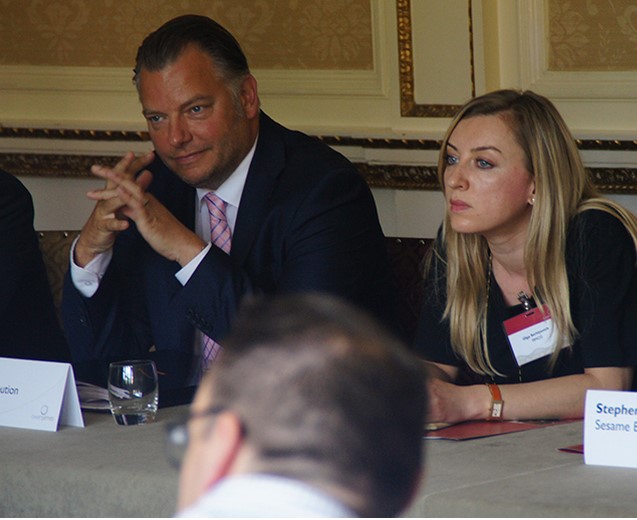
Experts: Monica Miskelly, Multrees and Brad Young, Time Inc
Key message
How exactly can wealth managers’ technology systems facilitate relationship managers in their engagement with clients? This roundtable’s discussion focused on how wealth managers today need to fundamentally rethink the ways in which they can transform from an omni-channel operation, to a digitally-savvy, client centric, multi-channel organisation.
Headlines
- Wealth management firms need to adopt digital marketing strategies, teaching their relationship managers how to use technology to engage clients.
- Adopting a digital strategy is beneficial not only for clients, but for advisers as well – it can help gather important and relevant data.
- Content production shared through digital mediums such as social media channels is essential in grabbing the attention of targeted potential clients.
Key themes
A major challenge facing wealth management firms today is the pace at which technological innovation is moving. However, with challenges come opportunities to grow and strengthen – and as such, there is a huge business opportunity to enhance client engagement by helping relationship managers improve their technological capabilities.
In this day and age, a firm’s digital presence becomes the face of the brand – it is one of the first things clients (and potential clients) will see. In this sense, firms have to ask themselves big questions before posting anything online – what do you want to say as a brand? What do people want to hear? If digital performance is poor, clients will soon associate the same poor performance to the face-to-face relationships offered by the firm.
And although diving into the digital deep end may sound daunting, the roundtable was reassured that amongst these constantly shifting sands, achieving high levels of digital satisfaction is in fact very possible and easily achievable. Delegates discussed the multiple benefits that technology brings with it – not only does it drive engagement on the client side but it can also help advisers manage their work and gather client data as well:
“The key word is time – time, because an improvement in technology leads to fast digital delivery to clients. And fast digital delivery to clients frees up investment managers’ time to meet new clients; this freed-up time ultimately then also creates new leads.”
Be that as it may, experts emphasised that it was important to remember that technology cannot substitute face-to-face expertise – tech can be used as a complimentary tool in engaging clients, but first, advisers need to fully understand how to provide rock-solid, expert diagnosis to their clients.
Discussions were then veered towards better understanding the profiles of clients that higher levels of digital engagement would interest, and how exactly relationship managers could tailor their propositions to these individuals. Several delegates agreed that the digitally-savvy client group were those under 40.
“The beauty of technology is that it allows flexibility – you can provide the right aspects to different clients. In other words, you tailor your tech offerings – offering it only to the clients who are interested. At the end of the day, it is all about behavioural economics and knowing your client.”
Advice was sought from the experts as to the best ways to approach digital transformation. In-house content production was heavily recommended as an easy and cheap way to reach out to clients, leveraging expert knowledge and demonstrating multi-channel proficiency.
Delegates were keen to understand what type of content most readily attracts clients’ interests. Contrary to popular belief, wealth management clients do not necessarily want to read about financially-related topics. It was argued that HNW individuals are most drawn to firms that can demonstrate creative and insightful knowledge in their shared content. Thought leadership pieces or articles focusing on specific issues such as entrepreneurship for example, are commonly noted as topics of keen interest.
Similarly diversification in content output vehicles is critical to standing out. It was noted that video content is very positively received, which is why financial services firms are increasingly investing in YouTube accounts. Using Twitter and Facebook is becoming more common practice across different firms because of their effectiveness in providing a platform on which firms and advisers can deliver immediate commentary on market trends. Being engaged with real-time events demonstrates informed and up-to-date expertise. Social media access is becoming imperative; in fact, many social media compliance rules are now changing, in order to accommodate this (i.e. Financial Promotions Act).
Content released on social media can also be targeted to specific groups – this allows firms to direct certain posts towards their desired target client group (i.e. institutional clients). Additionally, measuring success of business also becomes easier with social media– many of these websites enable a ‘percentage of engagement monitor’, which analyses how popular firms’ posts have been with their clients/readers.
Beyond the content question, numerous delegates had queries regarding the infrastructure needed to support relationship managers as they embark on the path to digital transformation.
“Clients are already far down the tech progression food chain; it is the investment managers that are resisting…”
However, success in these online strategies goes beyond mere digital presence. Delegates discussed the tactics needed to get smart about digital client engagement. For example, identifying key times to contact clients is essential – times between 9am and 5pm are becoming increasingly irrelevant, due to the fact that clients are most probably at work and generally busy. The strengthened relationship between an adviser and a client can be attained by engaging outside of work hours or on weekends through usage of other instant contact platforms (i.e. WhatsApp). Advisers need to learn about engaging with clients on their terms.
It is an exciting time to be in the industry – wealth management firms now have the opportunity to guide their relationship managers into the digital era, teaching them about seamless online to offline transitions. Clients want multi-channel operational relationships; leveraging both digital and personal interactions will inevitably lead to stronger adviser-client relationships, experience and business outcomes.




